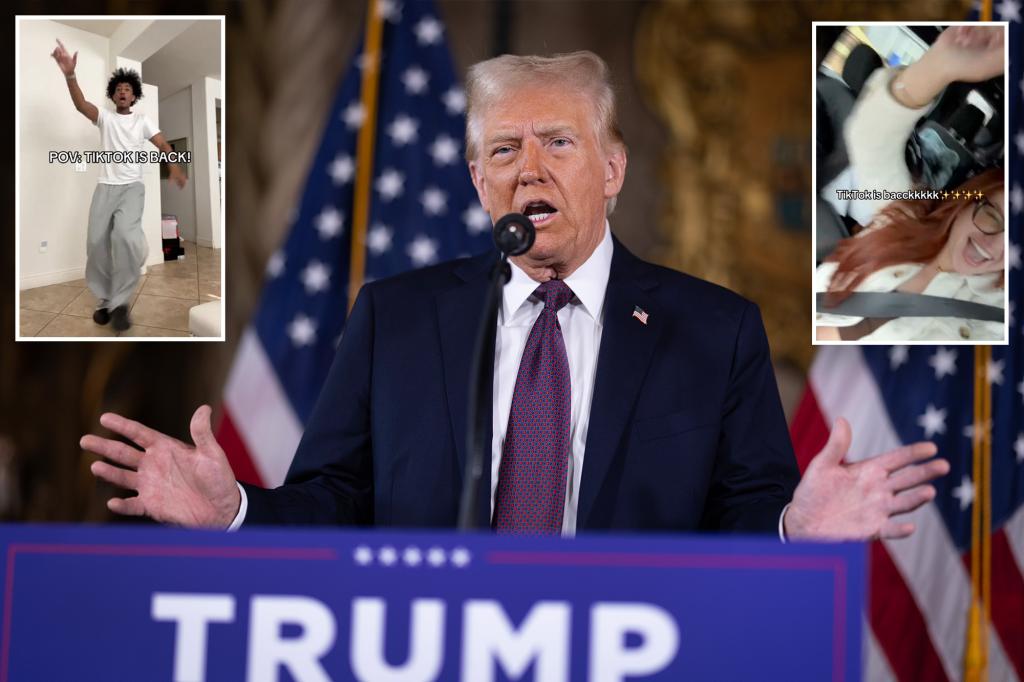The rollercoaster ride of TikTok’s temporary ban and subsequent revival in the United States sparked a flurry of reactions on social media platforms, particularly X (formerly Twitter). News of the ban’s reprieve, orchestrated by then President-elect Donald Trump just hours after the app went dark, was met with jubilation by many TikTok users, who expressed relief and celebrated their return to the platform. The swift reversal of the ban also generated surprise and amusement, with users commenting on the “whiplash” of events and the unexpectedness of the app’s rapid resurrection. The incident highlighted the platform’s significant user base in the US, estimated at over 170 million, and its importance to the approximately 7 million small businesses that rely on it for promotion. However, the reprieve was not universally welcomed, with some expressing concerns about the app’s potential negative impacts and questioning the wisdom of its continued operation.
The controversy surrounding TikTok stemmed from long-standing concerns regarding its ownership by the Chinese company ByteDance and the potential for the app to be used for espionage or data collection by the Chinese government. These concerns had led to bipartisan support for a ban on the app’s use in the US, culminating in a Supreme Court decision upholding the ban in April. Despite this, Trump’s intervention provided a temporary reprieve, allowing TikTok 90 days to divest itself from Chinese ownership and address the security concerns. This move surprised many, given the previous bipartisan consensus on the ban and the perceived national security risks associated with the app. TikTok expressed gratitude for the reprieve, emphasizing the platform’s large user base and its importance to small businesses across the US.
The swift turnaround in TikTok’s fortunes elicited a range of reactions on social media. Many users expressed relief and joy at the app’s return, sharing their experiences of the brief hiatus and their eagerness to resume using the platform. Others commented on the speed and unexpectedness of the reversal, expressing a mixture of amusement and disbelief at the sudden shift in events. The incident also underscored the significant role TikTok plays in the lives of many Americans, particularly younger users, and its growing importance as a platform for entertainment, communication, and business promotion. The temporary ban highlighted the platform’s immense popularity and the potential disruption its absence could cause.
However, the reprieve was not without its critics. Some users voiced concerns about the potential security risks associated with the app and questioned the wisdom of allowing it to continue operating, even temporarily. These concerns reflected the ongoing debate surrounding data privacy, national security, and the potential for foreign governments to access user data through social media platforms. The incident also highlighted the complex interplay between politics, technology, and national security, as well as the challenges of regulating global tech companies. The temporary nature of the reprieve further added to the uncertainty, leaving the future of TikTok in the US hanging in the balance.
The TikTok saga also brought into focus the role of influential figures like Elon Musk, who publicly opposed the ban, citing concerns about freedom of speech. Musk’s intervention highlighted the broader debate about the balance between free speech and national security, and the challenges of regulating social media platforms without infringing on fundamental rights. His comments also drew attention to the asymmetry in access to online platforms between the US and China, highlighting the complexities of navigating international relations in the digital age. The incident underscored the growing influence of tech billionaires in shaping public discourse and policy decisions related to technology and the internet.
In summary, the brief ban and subsequent reprieve of TikTok in the US ignited a firestorm of reactions and highlighted the complex issues surrounding data privacy, national security, and the role of social media platforms in modern society. The incident underscored the immense popularity of TikTok, its importance to millions of users and businesses, and the potential consequences of restricting access to online platforms. The temporary nature of the reprieve left the future of TikTok in the US uncertain, with the ongoing debate about its security risks and the potential for Chinese government influence likely to continue. The incident also highlighted the growing influence of tech industry leaders in shaping public discourse and policy decisions related to technology and the internet.

